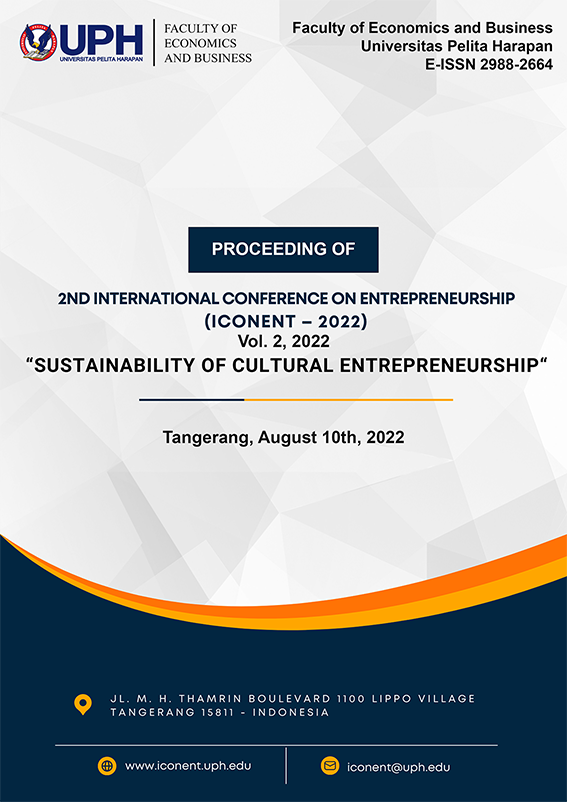CONSUMER EXPERIENCES, TIME SAVING ORIENTATION, AND PRICE SAVING ORIENTATION ON ACTUAL BEHAVIOR TO USE APPLICATION ONLINE DELIVERY FOOD GRABFOOD THROUGH CONVENIENCE MOTIVATION
Keywords:
Consumer Experiences, Time Saving Orientation, Price Saving Orientation, Convenience Motivation, Actual BehaviorAbstract
The purpose of this study was to determine the effect of consumer experiences, time saving orientation, and price saving orientation on actual behavior using grab food through convenience motivation as an intervening variable. This study uses a quantitative approach and a pilot study of 30 respondents was conducted to test the research instrument. The object of this research is the people of Bekasi City by using a sample of 136 respondents. The data analysis technique in this study uses regression uing the SPSS version 24 application. The results show that consumer experiences, time saving orientation, and price saving orientation variables have a significant effect on actual behavior and convenience motivation in using grab food. Meanwhile, convenience motivation is able to mediate consumer experiences, time saving orientation, and price saving orientation towards actual behavior in using grab food.
References
[1] Adhikari, A. and Bhattacharya, S. (2016), “Appraisal of literature on customer experience in tourism sector: review and framework”, Current Issues in Tourism, Vol. 19 No. 4, pp. 296-321.
[2] Ambarwati, S., & Isnugroho, E. (2018). OF Tourism and Economic. 1(1), 10-18.
[3] Binkhorst, E. and Den Dekker, T. (2009), “Agenda for co-creation tourism experience research”, Journal of Hospitality Marketing and Management, Vol. 18 Nos 2/3, pp. 311-327.
[3] Brakus, J.J., Schmitt, B.H. and Zarantonello, L. (2009), “Brand experience: what is it? How is it measured? Does it affect loyalty?”, Journal of Marketing, Vol. 73 No. 3, pp. 52-68.
[4] Buonincontri, P., Morvillo, A., Okumus, F. and van Niekerk, M. (2017), “Managing the experience co creation process in tourism destinations: empirical findings from Naples”, Tourism Management, Vol. 62, pp. 264-277.
[2] Chang, C.-C., Yan, C. F., & Tseng, J.-S. (2012). Perceived convenience in an extended technology acceptance model: Mobile technology and English learning for college students. Australasian Journal of Educational Technology, 28(5), 809-826. https://doi.org/10.14742/ajet.818.
[2] Daud, D. (2019). The Relationship Between Consumers’ Price - Saving Orientation and Time - Saving Orientation Towards Food Delivery intermediaries (FDI) Services: An Exploratory Study. Global Scientific Journals, 7(2), 175-190. shttps://www.researchgate.net/publication/331087317_The Relationship_Between_CTHE_RELATIONSHIP_BETWEEN_CONSUMERS’_PRICE_SAVING_ORIENTATION_AND_TI
[3] Escobar-RodrÃguez, T., & Carvajal-Trujillo, E. (2014). Online purchasing tickets for low cost carriers: An application of the unified theory of acceptance and use of technology (UTAUT) model. Tourism Management, 43, 70-88. https://doi.org/10.1016/j.tourman.2014.01.017
[4] V. Medina, R. Valdes, J. Azpiroz, and E. Sacristan, “Title of paper if known,” unpublished.
[5] Fathinah, F. K., & Baridwan, Z. (2015). Determinan minat individu dan pengaruhnya terhadap perilaku penggunaan sistem informasi berbasis teknologi di Bank Syariah.
[8] Jensen, J. M. (2012). Shopping orientation and online travel shopping: The role of 108 travel experience. International Journal of Tourism Research, 14(1), 56-70. https://doi.org/10.1002/jtr.835
[6] Lin, W. (2008). Construction of on-line consumer behavior models: a comparative study of industries in Taiwan. https://doi.org/10.1108/10569210810895221.
[7] Ma’ruf, S. (2018). Pengaruh Kemudahan Penggunaan, Kegunaan, Persepsi Risiko, Dan Kenyamanan Terhadap Sikap Konsumen Dalam Belanja Online. 3, 535-549. Handicapped (Presented Conference Paper style),” presented at the 4th Annu. Meeting Biomedical Engineering Society, Los Angeles, CA, 1973.
[8] Meeprom, S. and Silanoi, T. (2020), “Investigating the perceived quality of a special event and its influence on perceived value and behavioural intentions in a special event in Thailand”, International Journal of Event and Festival Management, Vol. 11 No. 3, pp. 337-355.
[9] Menard, P., Gatlin, R., & Warkentin, M. (2016). Threat Protection and Convenience: Antecedents of Cloud-Based Data Backup Threat Protection and Convenience: Antecedents of Cloud Basis Data Backup 4417(May). https://doi.org/10.1080/08874417.2014.11645743
[9] Nasir, M., Adil, M. and Dhamija, A. (2021), “The synergetic effect of after sales service, customer satisfaction, loyalty and repurchase intention on word of mouth”, International Journal of Quality and Service Sciences, Vol. 13 No. 3, pp. 489-505.
[11] Prebensen, N.K. and Foss, L. (2011), “Coping and co-creating in tourist experiences”, International Journal of Tourism Research, Vol. 13 No. 1, pp. 54-67.
[9] Yeo, V. C. S., Goh, S.-K., & Rezaei, S. (2017). Consumer experiences, attitude and behavioral intention toward online food delivery (OFD) services. Journal of Retailing and Consumer Services, 35, 150-162.https://doi.org/10.1016/J.JRETCONSER.2016.12.013.
[10] J. P. Wilkinson, “Nonlinear resonant circuit devices (Patent style),” U.S. Patent 3 624 12, July 16, 1990.
[12] Yeo, V. C. S., Goh, S.-K., & Rezaei, S. (2017). Consumer experiences, attitude and behavioral intention toward online food delivery (OFD) services. Journal of Retailing and Consumer Services, 35, 150-162. https://doi.org/10.1016/J.JRETCONSER.2016.12.013
[11] Yi, Y. and Nataraajan, R. (2018), “Customer satisfaction in Asia”, Psychology and Marketing, Vol. 35 No. 6, pp. 387-391.

 Fakultas Ekonomi dan Bisnis | Universitas Pelita Harapan | Kampus Universitas Pelita Harapan | Gedung F Lt. 12 | Lippo Karawaci, Tangerang - 15811 | Telp 021-5460901 | Fax 54210992
Fakultas Ekonomi dan Bisnis | Universitas Pelita Harapan | Kampus Universitas Pelita Harapan | Gedung F Lt. 12 | Lippo Karawaci, Tangerang - 15811 | Telp 021-5460901 | Fax 54210992